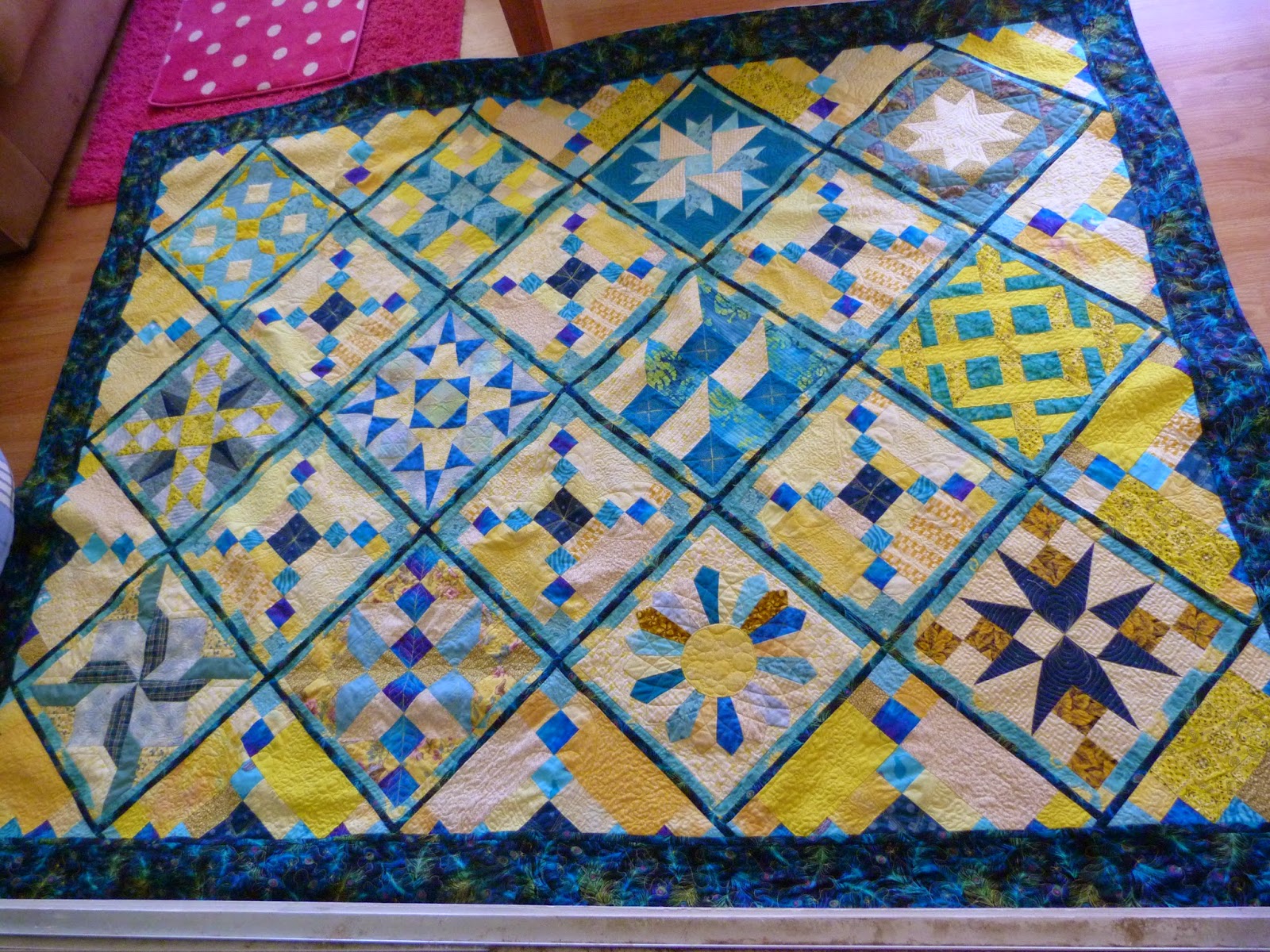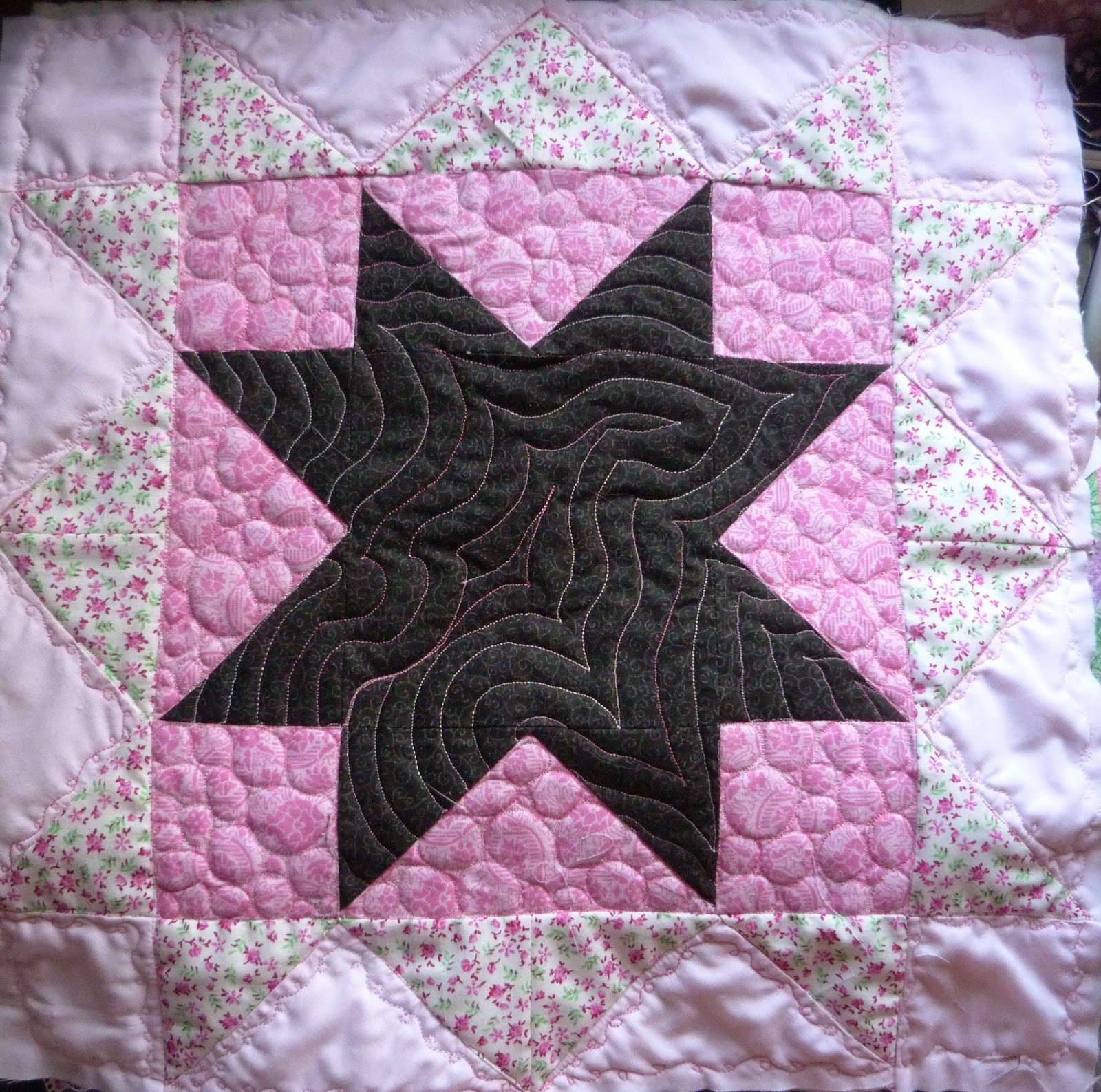My quilting pursuit has led to an insatiable desire to further challenge myself. And, there are so many possibilities. It seems there are always new skills to practice and new ideas to ponder; there is always something to try that I haven't done before. From what I can see, quilting has no bounds.
This is such an exciting time to learn, not just about quilting, but whatever our interest. It is easier than ever before to get answers to each question that comes to mind. Just Google it. Someone has probably asked the same question already to which multiple answers are available.
For me, and my latest quilting obsession, my questions are often satisfied by the abundance of You Tube videos filled with instruction and inspiration. I'm so grateful to the many artists that have come forward to share information and techniques with the rest of us.

My most recent quilt, 'Stars on Point,' was more to me than a comfy coverlet for the bed. It was a learning experience.
I learned new skills and honed some of those I had already become familiar with. I've already written about some of those in earlier posts, but to summarize, the following are just a few of my challenges from this project:
- Moving bravely away from monochromatic projects; This is the first time I designed a two-color quilt.
- More precise piecing; There is no end to the need for practice matching points and keeping seams straight. Precision is necessary in cutting, sewing, and pressing.
- Practicing paper piecing; Some of these blocks were created using paper-piecing. I hated it when I first tried it. Now, I'm seeing how useful it can be and am anxious to further explore this technique.
- Practice at free-motion quilting; I will always need to practice this skill. Thankfully, I have noticed an improvement since I first started. I am now more comfortable free-motion quilting. This is the second quilt I have done this way--as a quilt-as-you-go (QAYG) project, where the quilting is done before assembling the quilt rather than after. I'm hooked. I've learned that quilting is more than a way to anchor the piecing. It is a design element all its own, enhancing the look of the design.
- First steps at modifying and enhancing a design; This was a Block-of-the-Month (BOM) project. When the year was over, there were 12 blocks that if sewn together and quilted traditionally would have made a perfectly acceptable and beautiful quilt. But I wanted more. So, I decided to set the blocks on-point, added 6 additional blocks and matching side triangles, to form a secondary pattern. Because the blocks are the same and form a linear pattern that travels across the quilt, they serve to draw the quilt together providing unity to what would have otherwise been just random blocks.
- Laying out blocks on point, complete with figuring set in triangles; I have never done this before and didn't have the first idea how to start.
- Carrying out the desired pattern into the set in triangles; I had no idea how to do this. Math equations, triangles and me, normally do not get along well, but I muddled through it.
- Practice with Electric Quilt 5 (I bought it years ago and never used it); EQ5 saved me by allowing me to draw a template and figure the size pieces to cut for the setting triangles and corners.
- Designing a pleasing patchwork backing; I wanted this quilt to be yellow and white gingham on the back, to be reversible, so I needed to follow a pattern on the front and on the back at the same time. I took digital pictures of the layout to help with that task.
The task at hand continues the challenge

I am currently working on Leah Day's Building Blocks Quilt Along, which I have also mentioned previously in CHQuilts. I've named it simply, "Black and white and pink all over."
The work on these quilt blocks is almost finished. The diagram at left isn't current, since I've already completed three of the six remaining blocks.
I've decided however, that it might be fun to challenge myself on this project as well. The blocks are going to finish at 8" x 8". There are 72 of them, so the quilt will be lap size. I've decided to add a few blocks to it. I have never made a quilt with varied sized blocks
before, but that is my aim. I have no idea if this is going to work, or if it will look good until I lay it all out. I will do keep my fingers crossed.

To figure out dimensions and what I still need to accomplish my goal, I printed out this diagram. I cut out the individual blocks and pasted them onto graph paper, drawing in the additions. So far, I've sewed a couple of them. There will be a few 16" x 16" blocks, a some 4" x 4's" and perhaps a few 8" x 4" blocks.
My first endeavor was to add my favorite block--the double star block--which I refer to as my signature block. I have made several table runners using it and I have also put it into my last two quilts. This will make the third.
I just love everything about this block and I never tire of making it. I did, however, have to figure out how to cut the pieces to the right size since the instructions I have is for a 12" x 12" block. So, once again, I used EQ5 to draw the block and print out the proper dimensions. After many hours of trying to figure out the program again, it worked! This block is 16" x 16," so it will be one of three large blocks in the quilt.

I've pieced these three blocks, (left)--the second pic
contains two 4" x 8" blocks--that will be used for fillers in this
quilt. I haven't quilted them yet, but am thinking of an overall
stippling design. I could probably stipple all day long. That is real
progress, since the first time I did this overall meander stitch, it was
anything but comfortable. Now, it feels perfectly natural.

I enjoyed making these blocks. It was a day of mindless sewing as I was practicing making flying geese by sewing triangles together. That worked pretty well and this was the result. I was able to use up some scrap fabric, which also makes me really happy.
Waste not, want not!
 This is my third FMQ quilt however, so I'm not a complete novice, though I still feel like a beginner in many ways.
This is my third FMQ quilt however, so I'm not a complete novice, though I still feel like a beginner in many ways.  It took three full days and part of the fourth to finish this part of the process. When I finally reviewed the method for making a two-toned border, I had far fewer problems. In fact, this was the first time I bound a quilt without having to look up the directions on how to finish. I joined the binding strips on the first try.
It took three full days and part of the fourth to finish this part of the process. When I finally reviewed the method for making a two-toned border, I had far fewer problems. In fact, this was the first time I bound a quilt without having to look up the directions on how to finish. I joined the binding strips on the first try. 


